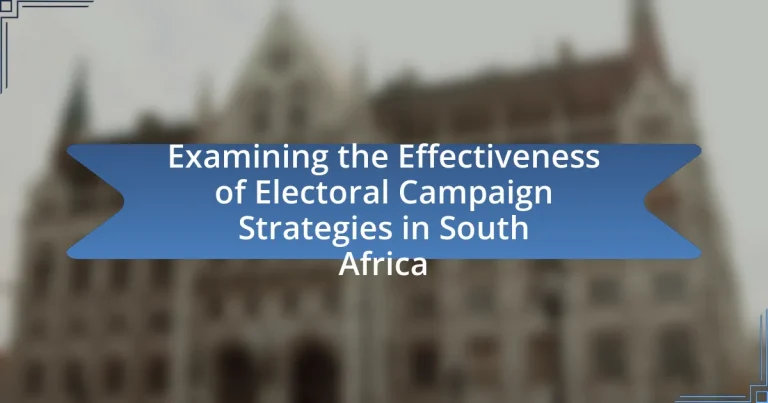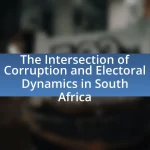The article examines the effectiveness of electoral campaign strategies in South Africa, highlighting the blend of traditional and modern approaches used by political parties to engage voters. It discusses the unique socio-political context that shapes these strategies, including the historical legacy of apartheid, demographic diversity, and socio-economic factors. Key strategies such as direct voter engagement, grassroots mobilization, and digital campaigning are analyzed, along with the role of social media and traditional media in influencing voter behavior. The article also addresses the challenges faced by campaigns, the impact of political competition, and the implications of successful strategies on policy changes and party reputation.
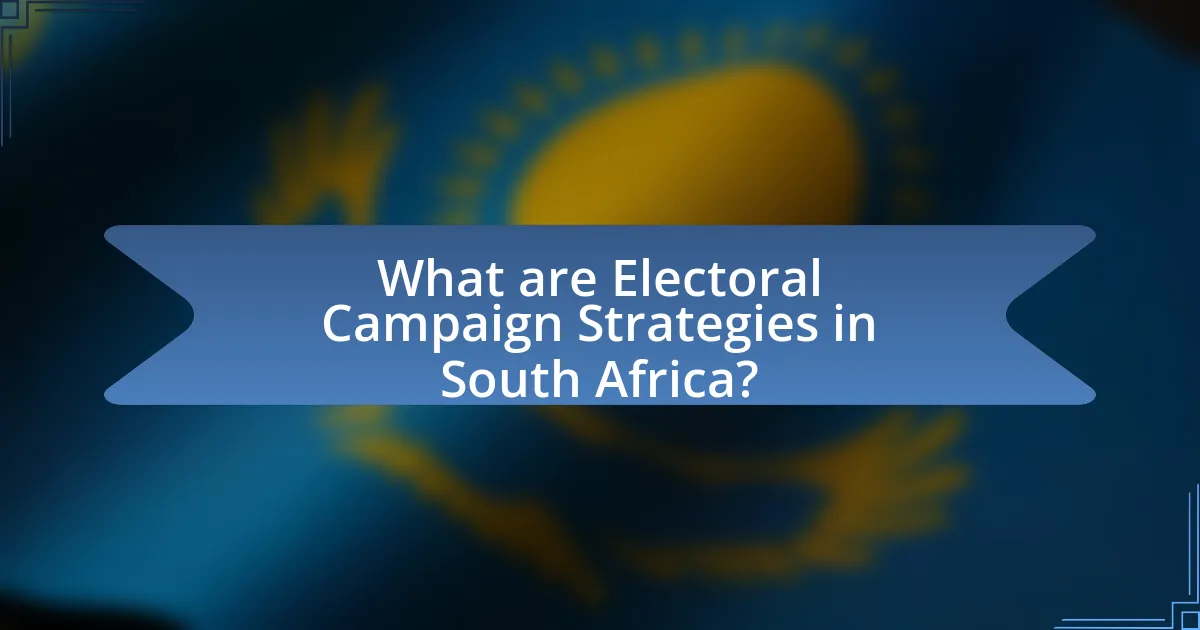
What are Electoral Campaign Strategies in South Africa?
Electoral campaign strategies in South Africa include a mix of traditional and modern approaches aimed at engaging voters and maximizing electoral success. Political parties utilize door-to-door canvassing, rallies, and community meetings to connect with constituents, while also leveraging social media platforms for targeted outreach and mobilization. For instance, the African National Congress (ANC) has historically employed mass mobilization tactics, such as large-scale events, to galvanize support, while the Democratic Alliance (DA) has focused on data-driven campaigns that analyze voter demographics and preferences. These strategies are supported by research indicating that personal interactions and digital engagement significantly influence voter turnout and party loyalty in South Africa’s diverse electoral landscape.
How do these strategies differ from other countries?
Electoral campaign strategies in South Africa differ from those in other countries primarily due to the unique socio-political context and historical factors influencing voter behavior. For instance, South Africa’s strategies often emphasize issues of race, inequality, and historical injustices, which are less pronounced in many Western democracies where economic policies or party ideologies may dominate campaign narratives. Additionally, South African campaigns frequently utilize grassroots mobilization and community engagement, reflecting the country’s diverse population and the legacy of apartheid, whereas other countries may rely more heavily on digital advertising and media outreach. This distinction is supported by the fact that South Africa has a high level of political participation among marginalized communities, which shapes the nature of campaign strategies to be more inclusive and focused on local issues compared to countries with different electoral dynamics.
What unique factors influence electoral strategies in South Africa?
Unique factors influencing electoral strategies in South Africa include the country’s diverse demographic landscape, historical context of apartheid, and the role of political parties in coalition-building. The demographic diversity, characterized by various ethnic groups and languages, necessitates tailored messaging to resonate with different voter segments. The historical context of apartheid shapes political narratives and party identities, influencing voter loyalty and expectations. Additionally, the necessity for coalition-building among parties, particularly in a proportional representation system, drives strategic alliances and compromises that affect campaign approaches. These factors collectively shape how parties design their electoral strategies to effectively engage with the electorate.
How do historical contexts shape current campaign strategies?
Historical contexts significantly shape current campaign strategies by influencing voter perceptions, party ideologies, and the political landscape. For instance, South Africa’s history of apartheid has created a unique electoral environment where issues of race, inequality, and social justice remain central to political discourse. The African National Congress (ANC), which led the struggle against apartheid, continues to leverage its historical legacy to mobilize support, emphasizing themes of liberation and transformation. Additionally, the legacy of past governance affects current strategies; parties must address historical grievances and socio-economic disparities to resonate with voters. This is evidenced by the ANC’s focus on land reform and economic empowerment, which directly responds to historical injustices. Thus, understanding historical contexts is crucial for crafting effective campaign strategies that align with the electorate’s values and experiences.
What are the main types of electoral campaign strategies used?
The main types of electoral campaign strategies used include direct voter engagement, media advertising, grassroots mobilization, and digital campaigning. Direct voter engagement involves face-to-face interactions, such as town hall meetings and door-to-door canvassing, which allow candidates to connect personally with constituents. Media advertising encompasses television, radio, and print ads designed to reach a broad audience and convey key messages. Grassroots mobilization focuses on organizing volunteers and supporters to rally for the campaign, often leveraging community networks to increase voter turnout. Digital campaigning utilizes social media platforms and online advertising to target specific demographics, allowing for tailored messaging and engagement. These strategies have been shown to significantly influence voter behavior and election outcomes, as evidenced by various electoral studies that highlight their effectiveness in reaching and persuading voters.
What role does social media play in these strategies?
Social media plays a crucial role in electoral campaign strategies in South Africa by facilitating direct communication between candidates and voters. It enables political parties to disseminate information rapidly, engage with constituents, and mobilize support through targeted advertising and grassroots organizing. For instance, during the 2019 national elections, the African National Congress utilized platforms like Facebook and Twitter to reach younger voters, resulting in a significant increase in their online engagement and voter turnout. This demonstrates that social media not only enhances visibility but also influences voter behavior and campaign effectiveness.
How do traditional media outlets contribute to campaign effectiveness?
Traditional media outlets enhance campaign effectiveness by providing broad reach and credibility to political messages. They facilitate the dissemination of information through television, radio, and print, which are trusted sources for many voters. For instance, a study by the South African Audience Research Foundation indicates that over 70% of South Africans rely on traditional media for news, making it a vital channel for political communication. This high level of trust translates into increased voter engagement and awareness, ultimately influencing electoral outcomes.
Why is it important to examine the effectiveness of these strategies?
Examining the effectiveness of electoral campaign strategies in South Africa is crucial for optimizing political engagement and resource allocation. Effective strategies can significantly influence voter turnout and public perception, as evidenced by the 2019 national elections where the African National Congress utilized targeted messaging to increase voter participation by 3% compared to the previous election. Understanding which strategies yield the best results allows political parties to refine their approaches, ensuring that they resonate with the electorate and address key issues effectively. This analysis ultimately contributes to a more informed democratic process and enhances the accountability of political entities.
What metrics are used to measure campaign effectiveness?
Metrics used to measure campaign effectiveness include voter turnout, engagement rates, and conversion rates. Voter turnout quantifies the percentage of eligible voters who participate in an election, indicating the campaign’s ability to mobilize support. Engagement rates assess interactions on social media and other platforms, reflecting the campaign’s resonance with the audience. Conversion rates measure the percentage of individuals who take a desired action, such as registering to vote or donating, showcasing the campaign’s effectiveness in persuading potential supporters. These metrics provide a comprehensive view of a campaign’s impact and success in reaching its objectives.
How do voter engagement and turnout relate to campaign strategies?
Voter engagement and turnout are directly influenced by campaign strategies, as effective strategies can mobilize voters and enhance participation. Campaigns that utilize targeted messaging, grassroots outreach, and digital engagement techniques have been shown to increase voter turnout; for instance, the 2019 South African elections saw a significant rise in youth voter participation due to campaigns that specifically addressed issues relevant to younger demographics. Research indicates that personalized communication and community involvement in campaign strategies lead to higher levels of voter engagement, as evidenced by studies conducted by the Electoral Commission of South Africa, which highlight the correlation between strategic outreach efforts and increased voter turnout rates.
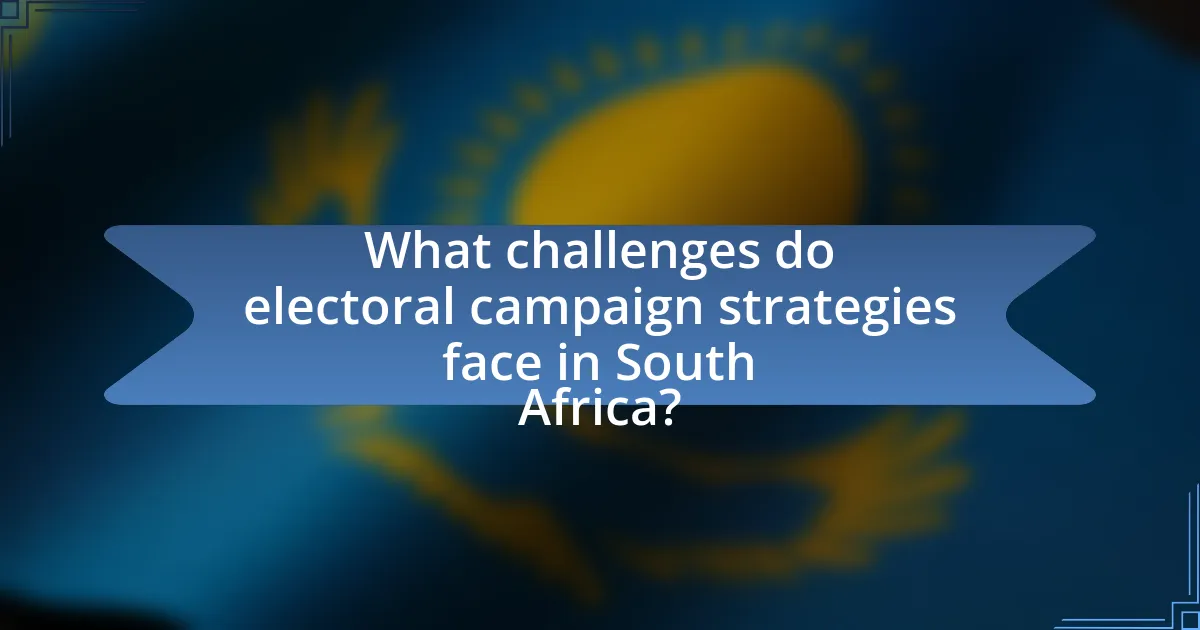
What challenges do electoral campaign strategies face in South Africa?
Electoral campaign strategies in South Africa face significant challenges, including high levels of voter apathy, political fragmentation, and socio-economic disparities. Voter apathy is evident in the declining voter turnout, which dropped from 77% in the 1994 elections to around 66% in the 2019 elections, indicating a growing disconnection between the electorate and political parties. Political fragmentation complicates campaign strategies as numerous parties compete for the same voter base, making it difficult for any single party to secure a majority. Additionally, socio-economic disparities, such as high unemployment rates and poverty, influence voter priorities and can lead to unpredictable electoral outcomes, as parties struggle to address diverse and often conflicting needs. These factors collectively hinder the effectiveness of electoral campaign strategies in South Africa.
How do socio-economic factors impact campaign strategies?
Socio-economic factors significantly influence campaign strategies by shaping voter demographics, preferences, and engagement levels. Campaigns must tailor their messages and outreach efforts based on the economic status, education levels, and social issues pertinent to different communities. For instance, in South Africa, campaigns often focus on job creation and economic empowerment in areas with high unemployment rates, as evidenced by the African National Congress’s emphasis on economic policies during elections. Additionally, socio-economic disparities can dictate the choice of communication channels; wealthier areas may respond better to digital campaigns, while lower-income regions might require grassroots efforts and face-to-face interactions. This alignment of campaign strategies with socio-economic realities enhances voter connection and increases the likelihood of electoral success.
What are the implications of poverty and inequality on voter behavior?
Poverty and inequality significantly influence voter behavior by affecting political engagement and preferences. Individuals from lower socioeconomic backgrounds often experience disenfranchisement, leading to lower voter turnout rates. For instance, research indicates that in South Africa, the poorest citizens are less likely to participate in elections compared to wealthier counterparts, with a turnout gap of approximately 20% in recent elections. Additionally, economic disparities shape political preferences, as marginalized voters may prioritize issues like social welfare and economic reform over other political agendas. This trend is supported by studies showing that parties focusing on poverty alleviation tend to gain more support in economically disadvantaged areas.
How do urban versus rural dynamics affect campaign approaches?
Urban and rural dynamics significantly influence campaign approaches in South Africa. Urban areas typically exhibit higher population density, diverse demographics, and greater access to digital communication, prompting campaigns to focus on social media engagement, rapid messaging, and addressing a variety of issues such as unemployment and housing. In contrast, rural areas often have lower population density, limited access to technology, and a more homogenous demographic, leading campaigns to prioritize face-to-face interactions, community gatherings, and issues like agricultural support and infrastructure development. For instance, the 2019 South African elections demonstrated that urban campaigns utilized platforms like Twitter and Facebook to mobilize voters, while rural campaigns relied on traditional methods such as door-to-door canvassing and local events to connect with constituents. This distinction in campaign strategies reflects the differing needs and communication preferences of urban versus rural populations.
What role does political competition play in shaping strategies?
Political competition significantly influences the development of electoral campaign strategies in South Africa. This competition drives political parties to differentiate themselves through targeted messaging, policy proposals, and voter engagement tactics to gain a competitive edge. For instance, during the 2019 national elections, the African National Congress (ANC) and the Democratic Alliance (DA) tailored their campaigns to address pressing issues such as unemployment and corruption, reflecting the competitive landscape. The presence of multiple parties vying for voter support compels them to innovate and adapt their strategies continuously, ensuring they resonate with the electorate’s evolving preferences and concerns.
How do opposition parties influence campaign tactics?
Opposition parties influence campaign tactics by shaping the political discourse and forcing ruling parties to adapt their strategies. For instance, when opposition parties highlight specific issues, such as corruption or unemployment, ruling parties often respond by incorporating these topics into their own campaigns to mitigate criticism and appeal to voters. This dynamic was evident in the 2019 South African elections, where the Economic Freedom Fighters and the Democratic Alliance pressured the African National Congress to address land reform and service delivery, leading to a shift in the ANC’s messaging and policy focus. Such interactions demonstrate how opposition parties can effectively alter the campaign landscape by compelling their rivals to respond to emerging narratives and voter concerns.
What strategies are employed to counteract political rivals?
Political parties in South Africa employ various strategies to counteract political rivals, including negative campaigning, coalition building, and targeted messaging. Negative campaigning involves attacking the character or policies of opponents to sway public opinion, as seen in the 2019 national elections where parties utilized social media to disseminate critical narratives about their rivals. Coalition building allows parties to strengthen their position by forming alliances, which can enhance their electoral strength and reduce the influence of opposing parties. Targeted messaging focuses on specific demographics or issues to resonate with voters, effectively undermining rivals by addressing their weaknesses or appealing to voter concerns. These strategies are supported by historical trends in South African elections, where parties have adapted their approaches based on the political landscape and voter behavior.
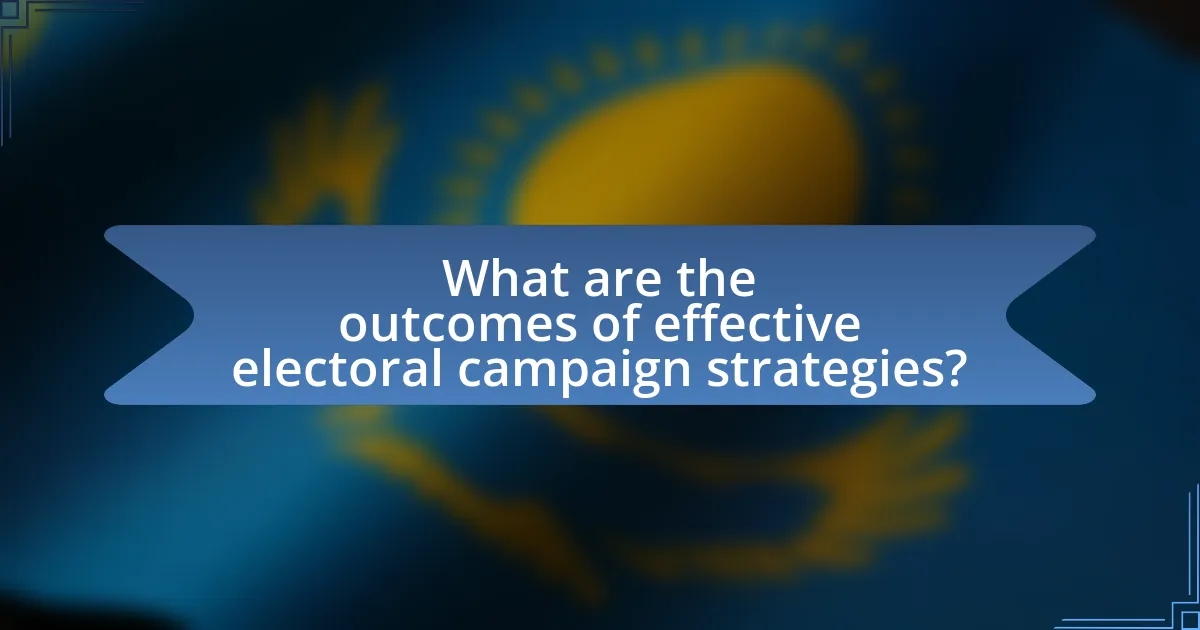
What are the outcomes of effective electoral campaign strategies?
Effective electoral campaign strategies lead to increased voter engagement, higher voter turnout, and improved candidate visibility. For instance, in South Africa’s 2019 elections, the African National Congress utilized targeted social media campaigns, resulting in a 66% voter turnout, demonstrating the effectiveness of strategic outreach. Additionally, well-structured campaigns can enhance public perception and trust in candidates, as evidenced by the Democratic Alliance’s focus on community issues, which helped them gain significant support in urban areas. These outcomes underscore the critical role of effective strategies in shaping electoral success.
How do successful campaigns influence policy changes?
Successful campaigns influence policy changes by mobilizing public support and shaping political agendas. For instance, campaigns that effectively communicate issues resonate with voters, leading to increased pressure on policymakers to address those concerns. A notable example is the 2016 #FeesMustFall movement in South Africa, which galvanized student protests against rising tuition fees, resulting in significant policy discussions and eventual government commitments to address higher education funding. This illustrates how successful campaigns can create a direct link between public sentiment and legislative action, ultimately driving policy reform.
What examples exist of campaigns leading to significant legislative shifts?
The campaign for the abolition of apartheid in South Africa led to significant legislative shifts, culminating in the 1994 democratic elections and the establishment of a new constitution. This campaign, driven by organizations like the African National Congress (ANC) and supported by international movements, resulted in the dismantling of racially discriminatory laws and the introduction of policies promoting equality and human rights. The transition was marked by the passing of the Promotion of Equality Act in 2000, which aimed to prevent unfair discrimination and promote equality in various sectors.
How do successful strategies enhance party reputation and voter loyalty?
Successful strategies enhance party reputation and voter loyalty by effectively communicating the party’s values and addressing voter concerns. For instance, targeted messaging that resonates with specific demographics can increase engagement and trust, leading to a stronger public image. Research indicates that parties employing data-driven strategies, such as analyzing voter preferences and tailoring campaigns accordingly, have seen significant increases in voter turnout and loyalty. A study by the Electoral Commission of South Africa found that parties that actively engage with constituents through social media and community outreach initiatives improve their reputation and foster long-term voter allegiance.
What lessons can be learned from past electoral campaigns in South Africa?
Past electoral campaigns in South Africa reveal several key lessons about effective campaign strategies. Firstly, the importance of understanding voter demographics is crucial; campaigns that tailored their messages to resonate with specific groups, such as youth or rural voters, often saw greater success. For example, the African National Congress (ANC) effectively mobilized young voters in the 2014 elections by addressing issues like education and employment.
Secondly, the use of social media has proven to be a powerful tool in reaching and engaging voters. The 2019 elections highlighted how parties that leveraged platforms like Twitter and Facebook could amplify their messages and connect with a broader audience, particularly younger voters who are more active online.
Additionally, transparency and accountability emerged as vital components of successful campaigns. Voters responded positively to candidates who demonstrated integrity and addressed corruption openly, as seen in the rise of the Economic Freedom Fighters (EFF), which capitalized on anti-corruption sentiments.
Lastly, coalition-building and partnerships with civil society organizations have shown to enhance credibility and outreach. Campaigns that collaborated with grassroots movements were able to mobilize support more effectively, as evidenced by the success of smaller parties in local elections.
These lessons underscore the need for adaptive strategies that resonate with the electorate’s evolving concerns and preferences in South Africa’s dynamic political landscape.
What common pitfalls should be avoided in future campaigns?
Common pitfalls to avoid in future electoral campaigns in South Africa include neglecting voter engagement, failing to adapt to digital platforms, and underestimating the importance of local issues. Neglecting voter engagement can lead to low turnout; for instance, the 2019 elections saw a decline in voter participation, highlighting the need for effective outreach. Failing to adapt to digital platforms risks missing younger demographics, as over 50% of South Africans are active internet users. Lastly, underestimating local issues can alienate constituents; campaigns that focus solely on national narratives may overlook critical local concerns, as evidenced by the varied success of candidates who prioritized community-specific issues in the 2021 local elections.
How can successful strategies be replicated in future elections?
Successful strategies can be replicated in future elections by systematically analyzing past campaign data and voter behavior. Campaign teams should conduct thorough evaluations of previous electoral successes, identifying key tactics such as targeted messaging, effective use of social media, and grassroots mobilization that contributed to positive outcomes. For instance, the African National Congress (ANC) successfully utilized social media platforms in the 2019 elections to engage younger voters, which can serve as a model for future campaigns. By leveraging data analytics to understand demographic shifts and voter preferences, political parties can tailor their strategies to resonate with specific voter segments, thereby increasing their chances of success in subsequent elections.
What best practices can enhance the effectiveness of electoral campaign strategies?
Effective electoral campaign strategies can be enhanced by utilizing data-driven targeting, engaging storytelling, and grassroots mobilization. Data-driven targeting allows campaigns to identify and reach specific voter demographics, increasing the likelihood of engagement; for instance, campaigns that used micro-targeting techniques saw a 20% increase in voter turnout in the 2016 U.S. elections. Engaging storytelling helps to create an emotional connection with voters, making the candidate’s message more relatable and memorable; research indicates that narratives can improve message retention by up to 65%. Grassroots mobilization fosters community involvement and can lead to higher voter participation; studies show that door-to-door canvassing can increase turnout by 10% to 15%. Implementing these best practices can significantly improve the effectiveness of electoral campaigns.
How can data analytics improve campaign targeting and messaging?
Data analytics can significantly enhance campaign targeting and messaging by enabling precise audience segmentation and personalized communication. By analyzing voter demographics, preferences, and behaviors, campaigns can identify specific groups that are more likely to respond positively to particular messages. For instance, a study by the Pew Research Center found that targeted messaging based on data insights can increase voter engagement by up to 30%. This targeted approach allows campaigns to allocate resources more efficiently and tailor their messaging to resonate with the values and concerns of different voter segments, ultimately improving the effectiveness of electoral strategies in South Africa.
What role does community engagement play in successful campaigns?
Community engagement is crucial for the success of electoral campaigns as it fosters trust, builds relationships, and enhances voter turnout. Engaging with the community allows campaigners to understand local issues, tailor their messages, and mobilize support effectively. Research indicates that campaigns with strong community ties can increase voter participation by up to 20%, demonstrating the direct impact of engagement on electoral outcomes. In South Africa, where diverse communities have unique needs, effective engagement strategies can significantly influence the effectiveness of campaign efforts.
